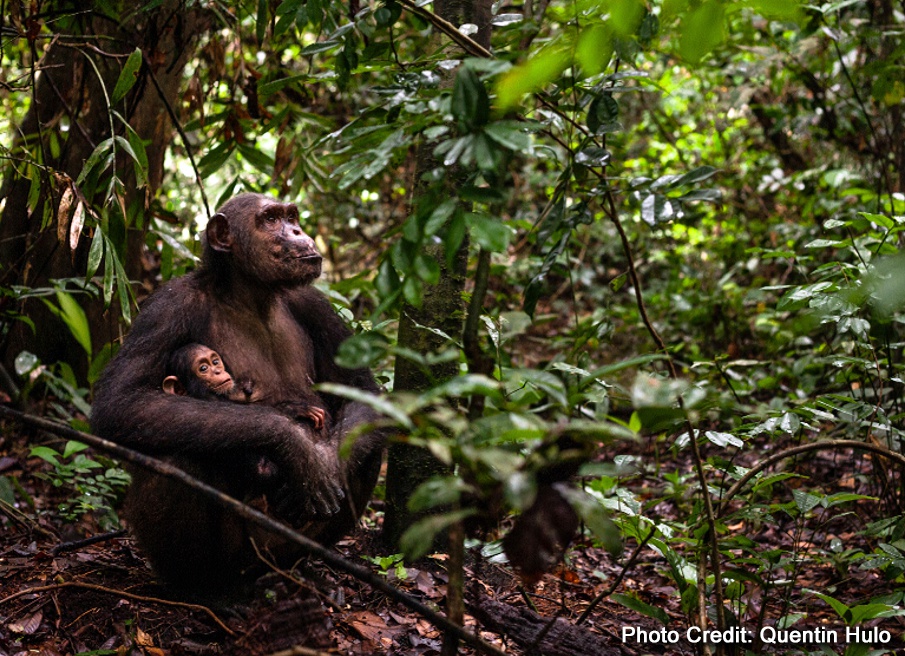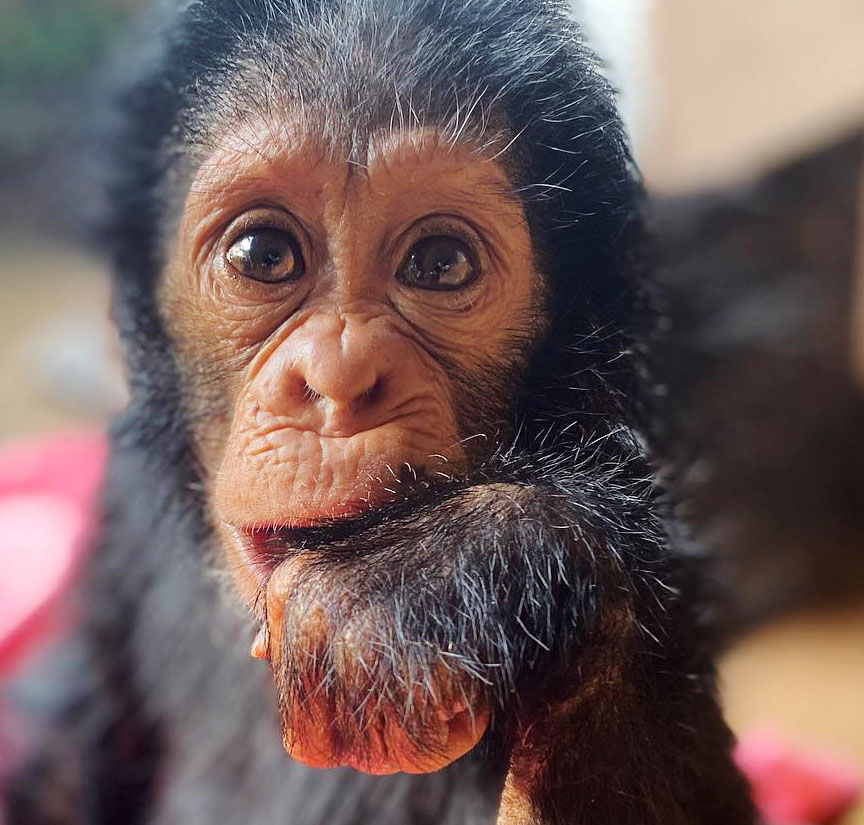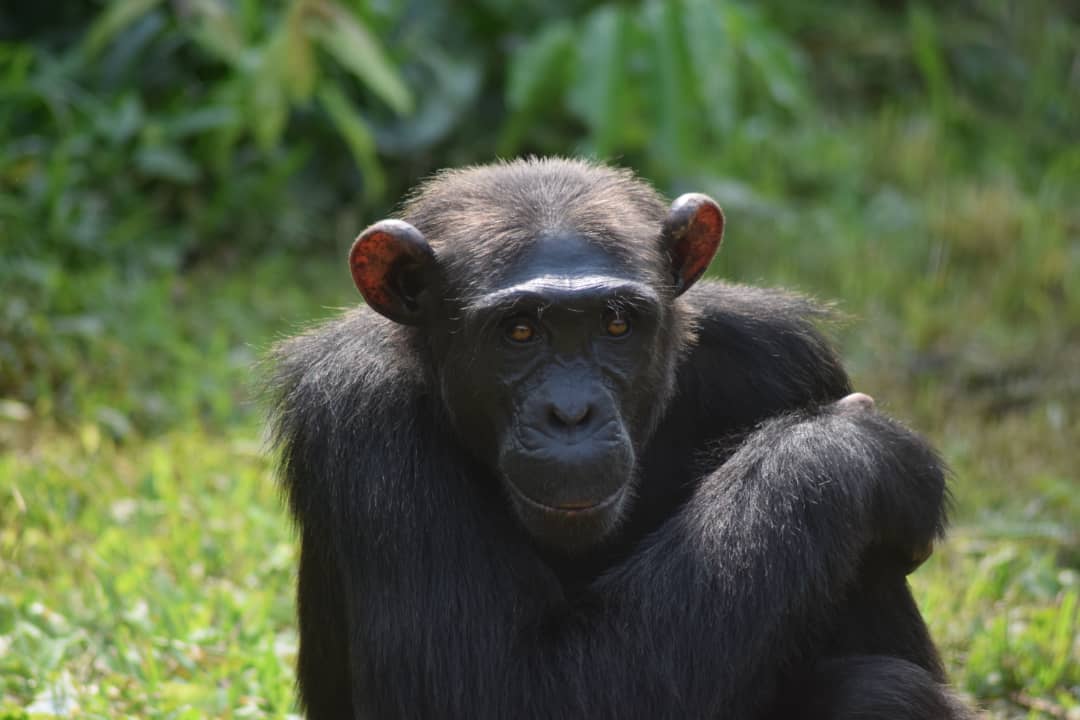Celebrating the Amazing – and Endangered –
Chimpanzee!
Chimpspiration for World Chimpanzee Day
By Jean Fleming
July 14 is World Chimpanzee Day, but here at PASA, we celebrate these amazing animals every day. Classified as an endangered species, PASA member sanctuaries rescue chimpanzees from the illegal wildlife trade, bushmeat hunters, and broken down roadside attractions. Each day, they give rescued chimps the care they need to heal and thrive. So in honor of this year’s World Chimpanzee Day, we’ve gathered some facts and figures on chimpanzee populations, chimp behavior, chimp lifespan – and we’re sharing just a few of the rescue stories that make our hearts sing.
Are Chimps Our Closest Relatives?
We share 98.8 percent of our DNA with chimpanzees and bonobos. This is one reason why the sanctuaries and wildlife centers in the PASA alliance take such care with biosecurity – because chimps are quite susceptible to our illnesses – from colds to COVID-19.
How many species of chimp are there – and how many chimps are left in the wild?
Chimpanzees are a species called Pan troglodytes in scientific circles, and there are four confirmed sub-species. The subspecies are:
- Central chimpanzee (Pan troglodytes troglodytes), found in Cameroon, Central African Republic, Equatorial Guinea, Gabon, the Republic of Congo, and Democratic Republic of Congo
- Estimated population: 140,000 Critically endangered
- Western chimpanzee (P. troglodytes verus) are found in Ivory Coast, Guinea, Liberia, Mali, Sierra Leone, Guinea-Bissau, Senegal and Ghana.
- Estimated population: 58,000
- Critically endangered
- Nigeria-Cameroon chimpanzee (P. troglodytes ellioti (also known as P. t. vellerosus), these chimps live in the forested areas of Nigeria and Cameroon
- Estimated population: 6,000-9,000
- Endangered
- Eastern chimpanzee (P. troglodytes schweinfurthii) are found in Central African Republic, South Sudan, the Democratic Republic of Congo, Uganda, Rwanda, Burundi, Tanzania, and Zambia
- Estimated population: 180,000-256,000
- Endangered
In the wild, how long do chimpanzee babies stay with their families?
Baby chimpanzees stay with their mothers and other family members for up to a decade. They do not get weaned until they are about five years old.
How long do chimpanzees live?
They live a long time! For male chimpanzees, the average lifespan is about 32 years. The average lifespan for female chimpanzees is a little longer, about 40 years. When they come to PASA member sanctuaries as babies, which many do, they receive life-long care. So it’s a commitment that spans decades.
How many chimpanzees do PASA members care for?
PASA’s 23 member sanctuaries care for over 1100 chimpanzees. These are the lucky ones who were rescued from poachers, spared by bushmeat hunters, or roadside animal attractions. In the last year, they rescued over 53 chimps – and this was during the global COVID-19 pandemic, so they did this work without many resources they were used to having.
Meet Lucie & Ujasiri & Captain
Lucie had a remarkable journey. Rescued from poachers at just a few months old by the founder of PASA-member HELP Congo, Lucie was brought to the sanctuary and joined a group of rescued chimpanzees. In 2000, they were reintroduced to the wild. She has now been living free for 21 years, giving birth to a son and daughter in her forest home! Give other chimps the same chance today!
Ujasiri means “courage” in Swahili. Found alone and sick by rangers in DR Congo, he was rushed to Lwiro Primate Rehabilitation Centre and given life-saving care. Now living safely with other chimps at the sanctuary, sweet-hearted Usajiri is so kind that he is often chosen as the first chimp to welcome the new babies to the sanctuary!
Captain has had a long journey to the vast forested enclosures of PASA-member Parc de la Lékédi in Gabon. Locked in a cage for 11 years, he was deeply traumatized and scared of other chimps when he was first rescued. After years of dedicated care and rehabilitation, he now spends his days playing in the forest with his new family. Help other chimps like Captain to recover today.
By giving just $5, you can feed a chimp today! Join our troop and help feed a chimp today!

Lucie was rescued by HELP Congo – and reintroduced to the wild, where she has lived for 21 years.
Photo credit: Quentin Hulo

Ujasiri was rescued by Lwiro Primate Rehabilitation Centre and now welcomes new babies to the sanctuary.
Photo credit: Lwiro Primate Rehabilitation Centre.

Captain was locked in a cage for 11 years before being rescued by Parc de la Lékédi.
Photo credit: Parc de la Lékédi
